Unit 6 When disaster strikers 知识梳理-2025-2026学年八年级英语上册新课标(核心素养)同步大师课堂(外研版2024)
文档属性
| 名称 | Unit 6 When disaster strikers 知识梳理-2025-2026学年八年级英语上册新课标(核心素养)同步大师课堂(外研版2024) | 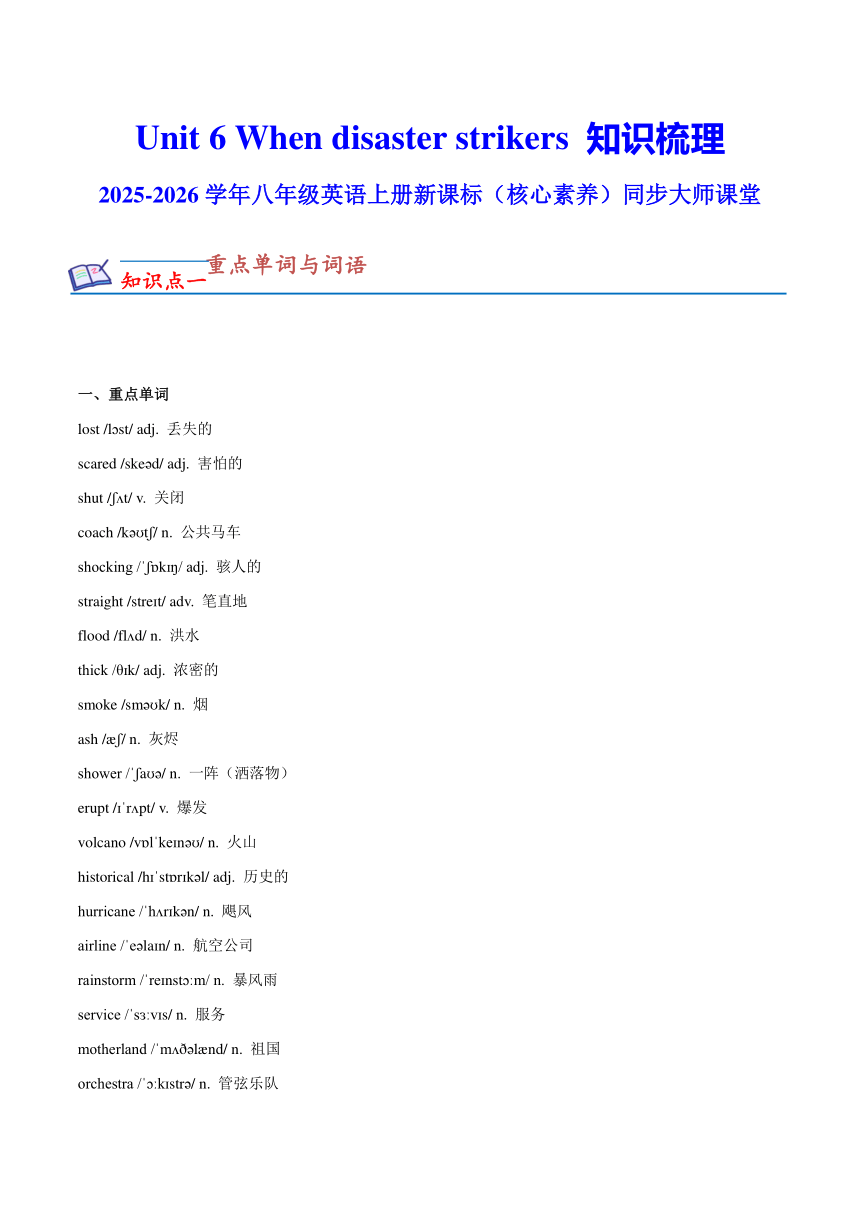 | |
| 格式 | docx | ||
| 文件大小 | 220.9KB | ||
| 资源类型 | 教案 | ||
| 版本资源 | 外研版 | ||
| 科目 | 英语 | ||
| 更新时间 | 2025-07-15 11:31:59 | ||
图片预览

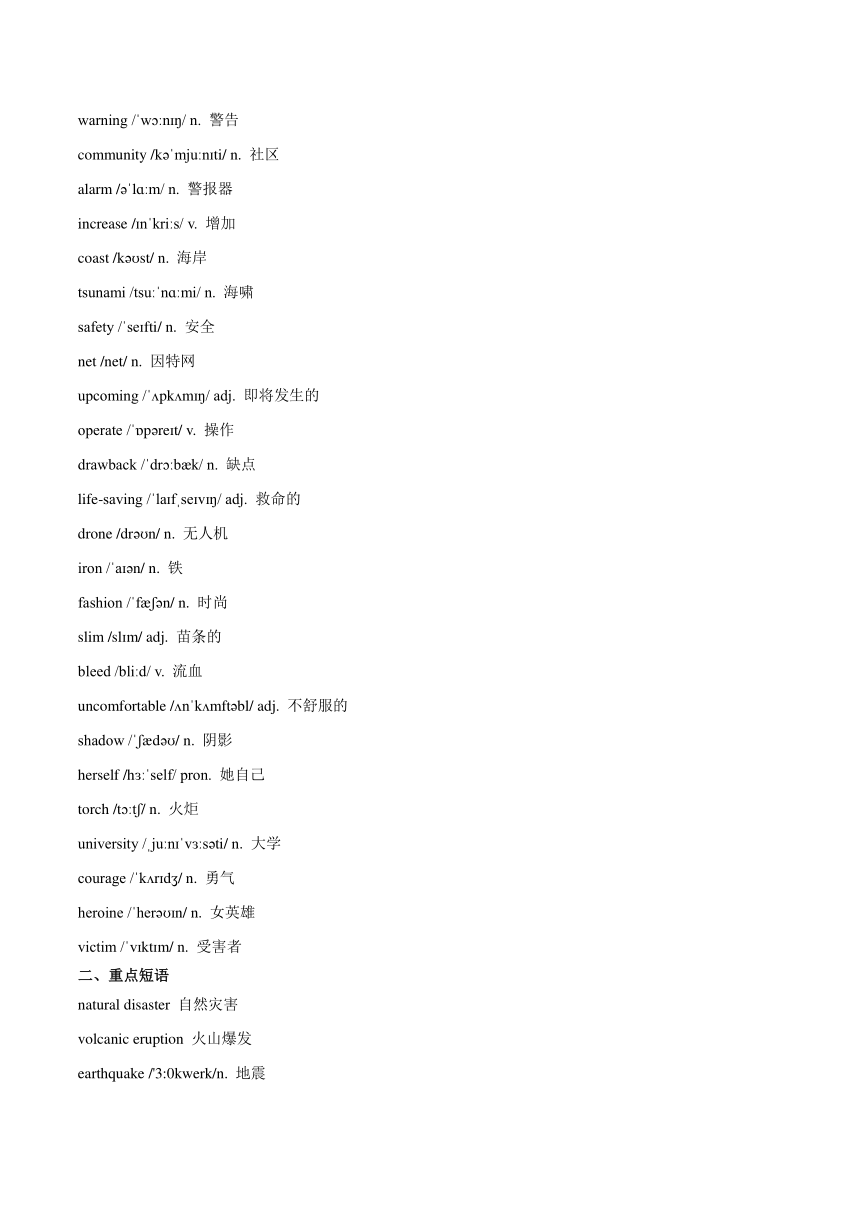
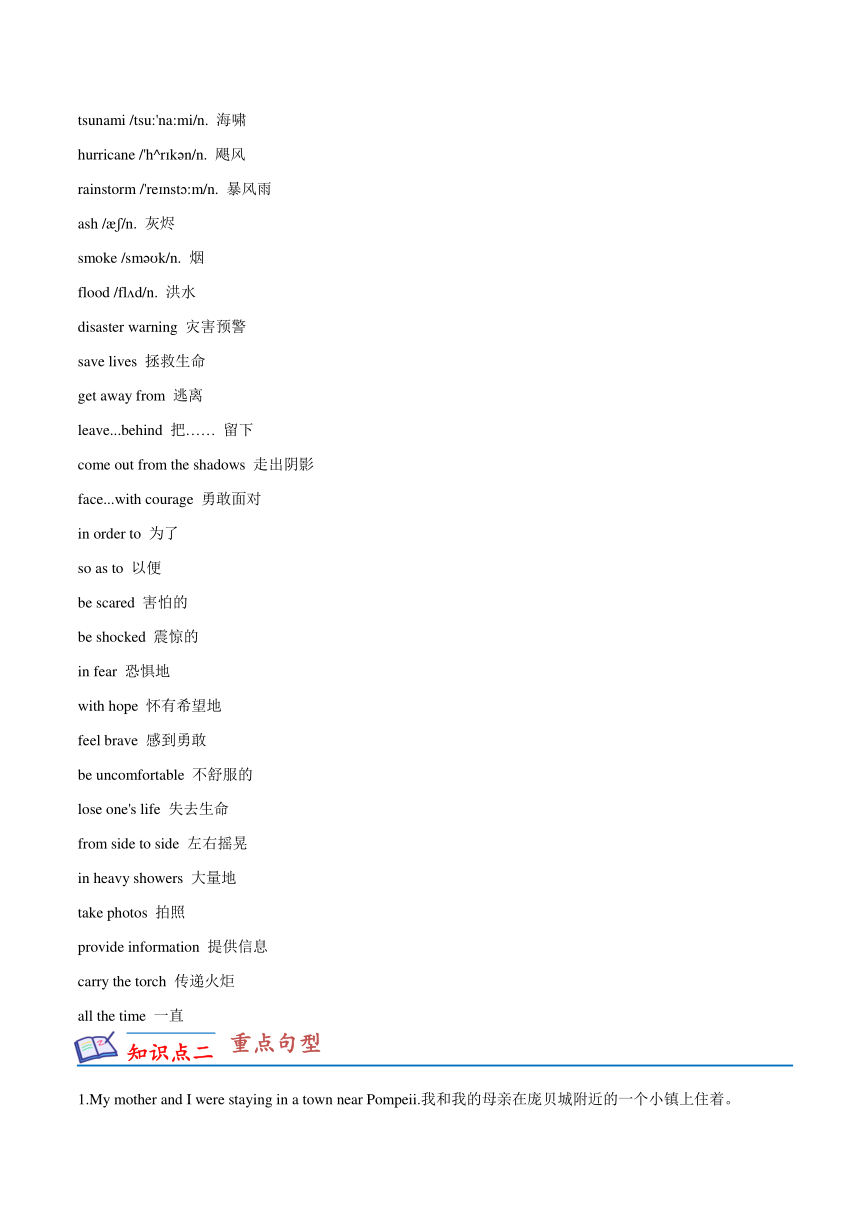
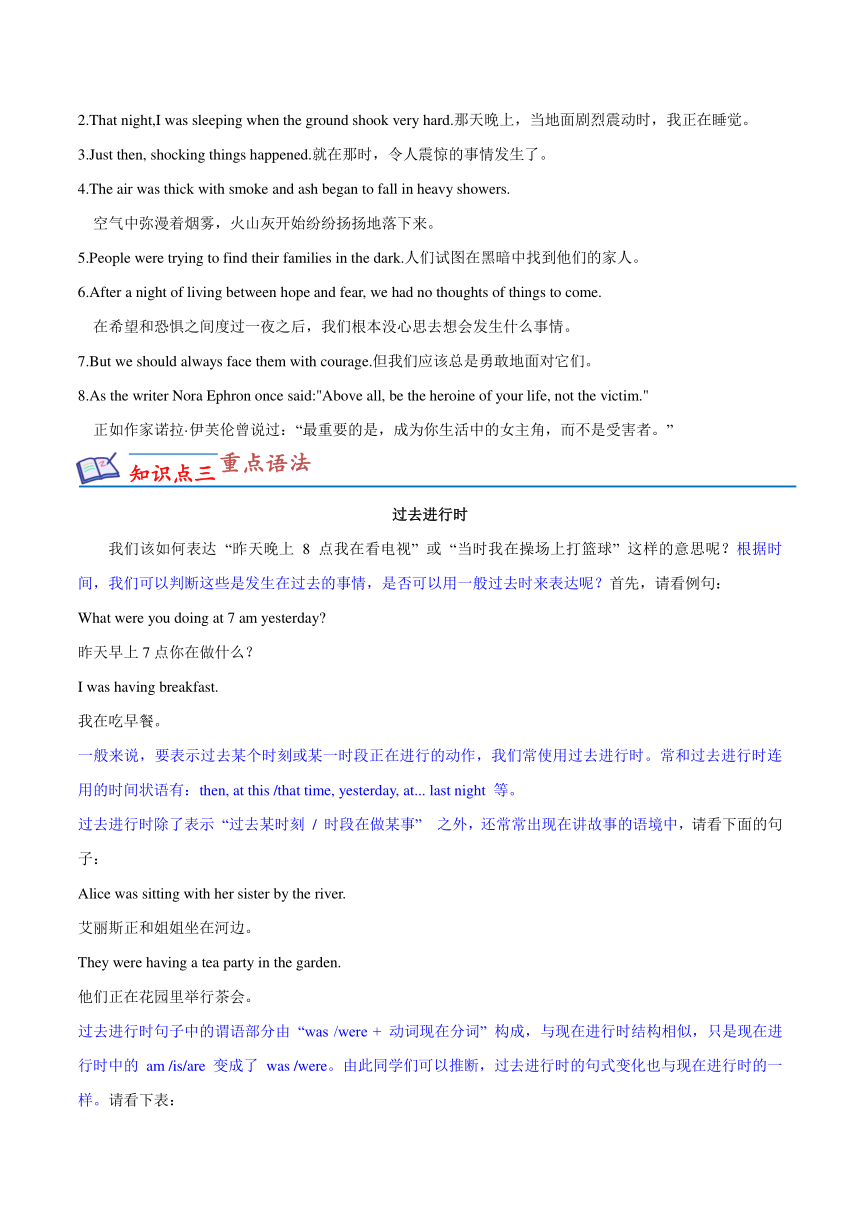
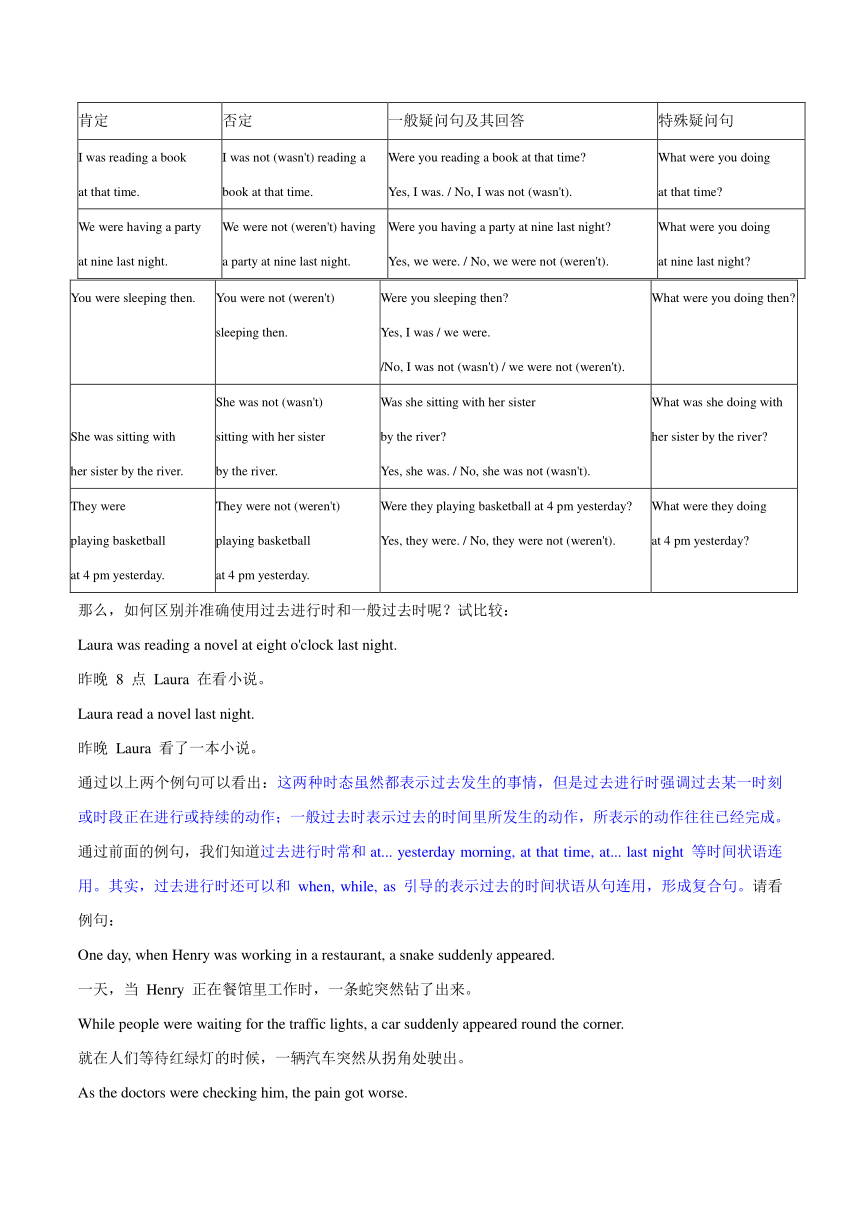
文档简介
Unit 6 When disaster strikers 知识梳理
2025-2026学年八年级英语上册新课标(核心素养)同步大师课堂
(
重点单词与词语
) (
知识点一
)
一、重点单词
lost /l st/ adj. 丢失的
scared /ske d/ adj. 害怕的
shut / t/ v. 关闭
coach /k t / n. 公共马车
shocking / k / adj. 骇人的
straight /stre t/ adv. 笔直地
flood /fl d/ n. 洪水
thick /θ k/ adj. 浓密的
smoke /sm k/ n. 烟
ash / / n. 灰烬
shower / a / n. 一阵(洒落物)
erupt / r pt/ v. 爆发
volcano /v l ke n / n. 火山
historical /h st r k l/ adj. 历史的
hurricane / h r k n/ n. 飓风
airline / e la n/ n. 航空公司
rainstorm / re nst m/ n. 暴风雨
service / s v s/ n. 服务
motherland / m l nd/ n. 祖国
orchestra / k str / n. 管弦乐队
warning / w n / n. 警告
community /k mju n ti/ n. 社区
alarm / lɑ m/ n. 警报器
increase / n kri s/ v. 增加
coast /k st/ n. 海岸
tsunami /tsu nɑ mi/ n. 海啸
safety / se fti/ n. 安全
net /net/ n. 因特网
upcoming / pk m / adj. 即将发生的
operate / p re t/ v. 操作
drawback / dr b k/ n. 缺点
life-saving / la f se v / adj. 救命的
drone /dr n/ n. 无人机
iron / a n/ n. 铁
fashion / f n/ n. 时尚
slim /sl m/ adj. 苗条的
bleed /bli d/ v. 流血
uncomfortable / n k mft bl/ adj. 不舒服的
shadow / d / n. 阴影
herself /h self/ pron. 她自己
torch /t t / n. 火炬
university / ju n v s ti/ n. 大学
courage / k r d / n. 勇气
heroine / her n/ n. 女英雄
victim / v kt m/ n. 受害者
二、重点短语
natural disaster 自然灾害
volcanic eruption 火山爆发
earthquake /'3:0kwerk/n. 地震
tsunami /tsu:'na:mi/n. 海啸
hurricane /'h^r k n/n. 飓风
rainstorm /'re nst :m/n. 暴风雨
ash / /n. 灰烬
smoke /sm k/n. 烟
flood /fl d/n. 洪水
disaster warning 灾害预警
save lives 拯救生命
get away from 逃离
leave...behind 把…… 留下
come out from the shadows 走出阴影
face...with courage 勇敢面对
in order to 为了
so as to 以便
be scared 害怕的
be shocked 震惊的
in fear 恐惧地
with hope 怀有希望地
feel brave 感到勇敢
be uncomfortable 不舒服的
lose one's life 失去生命
from side to side 左右摇晃
in heavy showers 大量地
take photos 拍照
provide information 提供信息
carry the torch 传递火炬
(
重点句型
) (
知识点二
)all the time 一直
1.My mother and I were staying in a town near Pompeii.我和我的母亲在庞贝城附近的一个小镇上住着。
2.That night,I was sleeping when the ground shook very hard.那天晚上,当地面剧烈震动时,我正在睡觉。
3.Just then, shocking things happened.就在那时,令人震惊的事情发生了。
4.The air was thick with smoke and ash began to fall in heavy showers.
空气中弥漫着烟雾,火山灰开始纷纷扬扬地落下来。
5.People were trying to find their families in the dark.人们试图在黑暗中找到他们的家人。
6.After a night of living between hope and fear, we had no thoughts of things to come.
在希望和恐惧之间度过一夜之后,我们根本没心思去想会发生什么事情。
7.But we should always face them with courage.但我们应该总是勇敢地面对它们。
8.As the writer Nora Ephron once said:"Above all, be the heroine of your life, not the victim."
(
重点语法
)正如作家诺拉·伊芙伦曾说过:“最重要的是,成为你生活中的女主角,而不是受害者。”
(
知识点三
)
过去进行时
我们该如何表达 “昨天晚上 8 点我在看电视” 或 “当时我在操场上打篮球” 这样的意思呢?根据时间,我们可以判断这些是发生在过去的事情,是否可以用一般过去时来表达呢?首先,请看例句:
What were you doing at 7 am yesterday
昨天早上7点你在做什么?
I was having breakfast.
我在吃早餐。
一般来说,要表示过去某个时刻或某一时段正在进行的动作,我们常使用过去进行时。常和过去进行时连用的时间状语有:then, at this /that time, yesterday, at... last night 等。
过去进行时除了表示 “过去某时刻 / 时段在做某事” 之外,还常常出现在讲故事的语境中,请看下面的句子:
Alice was sitting with her sister by the river.
艾丽斯正和姐姐坐在河边。
They were having a tea party in the garden.
他们正在花园里举行茶会。
过去进行时句子中的谓语部分由 “was /were + 动词现在分词” 构成,与现在进行时结构相似,只是现在进行时中的 am /is/are 变成了 was /were。由此同学们可以推断,过去进行时的句式变化也与现在进行时的一样。请看下表:
肯定 否定 一般疑问句及其回答 特殊疑问句
I was reading a book at that time. I was not (wasn't) reading a book at that time. Were you reading a book at that time Yes, I was. / No, I was not (wasn't). What were you doing at that time
We were having a party at nine last night. We were not (weren't) having a party at nine last night. Were you having a party at nine last night Yes, we were. / No, we were not (weren't). What were you doing at nine last night
You were sleeping then. You were not (weren't) sleeping then. Were you sleeping then Yes, I was / we were. /No, I was not (wasn't) / we were not (weren't). What were you doing then
She was sitting with her sister by the river. She was not (wasn't) sitting with her sister by the river. Was she sitting with her sister by the river Yes, she was. / No, she was not (wasn't). What was she doing with her sister by the river
They were playing basketball at 4 pm yesterday. They were not (weren't) playing basketball at 4 pm yesterday. Were they playing basketball at 4 pm yesterday Yes, they were. / No, they were not (weren't). What were they doing at 4 pm yesterday
那么,如何区别并准确使用过去进行时和一般过去时呢?试比较:
Laura was reading a novel at eight o'clock last night.
昨晚 8 点 Laura 在看小说。
Laura read a novel last night.
昨晚 Laura 看了一本小说。
通过以上两个例句可以看出:这两种时态虽然都表示过去发生的事情,但是过去进行时强调过去某一时刻或时段正在进行或持续的动作;一般过去时表示过去的时间里所发生的动作,所表示的动作往往已经完成。
通过前面的例句,我们知道过去进行时常和at... yesterday morning, at that time, at... last night 等时间状语连用。其实,过去进行时还可以和 when, while, as 引导的表示过去的时间状语从句连用,形成复合句。请看例句:
One day, when Henry was working in a restaurant, a snake suddenly appeared.
一天,当 Henry 正在餐馆里工作时,一条蛇突然钻了出来。
While people were waiting for the traffic lights, a car suddenly appeared round the corner.
就在人们等待红绿灯的时候,一辆汽车突然从拐角处驶出。
As the doctors were checking him, the pain got worse.
二天,医生给他做检查时,疼痛加剧了。
下面,让我们来分析 when 和 while 引导的从句与过去进行时连用的几种情况。
when 所引导的时间状语既可以指时间点,也可以指时间段;while 所引导的时间状语只指时间段。因此,在 when 引导的时间状语从句中,动词可以是终止性动词,也可以是延续性动词;而在 while 引导的时间状语从句中,动词必须是延续性动词。例如:
They arrived while we were having dinner. 我们吃饭的时候他们到了。
这句话还可以写成:They arrived when we were having dinner.
由 when 引导的时间状语从句,如果主句用过去进行时、从句用一般过去时,则表示一个动作正在进行的时候另一个动作 (突然) 发生了,强调后一动作发生的突然性。请看例句:
We were talking when the teacher came in. 我们正在讲话,老师 (突然) 进来了。
该句也可以用 while 表达,但与用 when 表达有细微的区别.
请注意体会: While we were talking, the teacher came in. 我们正在讲话的时候,老师进来了。(只表明老师进来的事实,不强调突然性)
当主句和从句的动作都是延续的或同时发生的,两句都用过去进行时的时候,多用 while 引导。例如:
They were singing while we were dancing.
(
重点知识
) (
知识点四
)他们在唱歌,我们在跳舞。
1、My mother was so scared. 我妈妈吓坏了。
scared adj. 害怕的, 恐惧的,吓坏的;常用的结构为:
①be scared of sth. “害怕某物”
She’s scared of snakes. 她害怕蛇。
②be scared to do sth. “害怕做某事”
She is scared to go out at night. 她晚上不敢出门。
③be scared that“担心”。
I am scared that he won’t come again. 我害怕他不会再来了。
scared 强调由外部原因引起的害怕或恐惧。恐惧的程度最轻
afraid 强调的是自身感觉。偏向于长期被恐惧的事物所影响
【辨析】
2、It turned day into night. 白天变成了黑夜。
turn. . . into. . . 把……变成……
【拓展】 常见短语:
When heated, ice can turn into water.
加热时,冰可以变成水。
Little lies may turn into big lies.
小谎言的慢慢积累也许就是弥天大谎。
3、The air was thick with smoke and ash began to fall in heavy showers. 空气中弥漫着浓烟,火山灰开始像阵雨一样飘落下来。
thick adj. 浓密的;混浊的
【拓展】
【拓展】
thick用作形容词,其反义词是thin。
There’s thick ice on the lake.
湖面上结了厚厚的冰。
He had thick black hair.
他有着浓密乌黑的头发。
4、China is one of many countries with disaster warning systems.中国是许多拥有灾害预警系统的国家之一。
warning n. 警告,警示;其动词为warn。
This doctor issued a warning against eating any fast food.
这位医生发出警告说不要吃任何快餐。
The warning signs on the road indicate a sharp turn ahead.
路上的警告标志表明前方有一个急转弯。
5、In communities,loud alarms go off. 在社区,响亮的警报响起。
go off 发出巨响
【拓展】
You mustn’t go off on your own. 你们禁止单独离开。
The candle is going off. 蜡烛要熄灭了。
The alarm clock is going off. 闹钟响了。
This bag of milk has gone off. 这袋牛奶已经变质了。
6、Warning times for storms in China have been increased to 42 minutes,with more than 90% being correct. 中国的风暴预警时间增加到42分钟,正确率超过90%。
increase v. 增加;增大;提高
1)作名词时,意为“增大;增长”;
People’s knowledge of traditional Chinese medicine is on the increase.
人们在中医方面的知识正在增长。
2)作动词时,意为“增长;提高;增大”。
Maybe it’s a good idea to increase your activity for keeping your health.
为了保持健康,增加你的活动量也许是个好主意。
【拓展】
on the increase 正在增长
increase to增长到 (接具体的数字,指增长后的数量)
increase by增长了 (接倍数、百分比等,指增幅))
7、During the 2021 Shanghai Fashion Week, a young, slim and confident woman with an iron leg drew everyone’s attention. 在2021上海时装周上,一位年轻、苗条、自信的铁腿女郎吸引了所有人的目光。
slim adj. 苗条的,修长的;作形容词;其反义词为fat,意为“肥胖的”。
The young woman is tall and slim.
那个年轻女子个子高挑,身材苗条。
This dress makes me look fat.
这衣服我穿着显胖。
8、But the disaster broke her dream. 但是这场灾难打破了她的梦想。
break one’s dream 打破某人的梦想;break的过去式为broke。
Losing the competition broke her dream of becoming a famous athlete.
输掉比赛打破了她成为著名运动员的梦想。
The sudden financial crisis broke his dream of starting his own business.
突如其来的金融危机打破了他创业的梦想。
【拓展】
9、It wasn’t comfortable, and her leg often bled. 这很不舒服,她的腿经常流血。
bleed v. 流血,出血;也可以作名词,意为“出血”。
Are you okay Sir, you’re bleeding.
你还好吗 先生,你流血了。
She slowly bled to death.
她慢慢地失血死去。
10、People’s curious eyes made her even more uncomfortable. 人们好奇的目光使她更加不安。
uncomfortable意为“不舒服的”,作形容词,其反义词是comfortable,意为“舒服的”。
I was sitting in an extremely uncomfortable position.
我坐着的姿势难受极了。
My room is small. However, it’s comfortable.
我的房间 (很)小。但它 (很)舒服。
【拓展】
uncomfortable的比较级为 more uncomfortable,最高级为 most uncomfortable
11、To her surprise, she received lots of encouraging words. 令她吃惊的是,她收到了许多鼓励的话。
encouraging adj. 令人鼓舞的,振奋人心的
encouraging意为“令人鼓舞的,振奋人心的”,作形容词,经常用来修饰物,常在句中作表语或名词的定语。
encouraged作形容词,主语通常是人,常在句中作表语。
encourage作动词,意为“鼓励”,常用的搭配:encourage sb. to do sth. “鼓励某人做某事”
We received some encouraging news about the school play, and it made everyone excited.
我们收到了有关学校话剧的一些鼓舞人心的消息,大家都很兴奋。
Her parents encouraged her to study hard.
她的父母鼓励她好好学习。
【拓展】以-ing和-ed结尾的常见同词根形容词
exciting令人兴奋的 excited感到兴奋的
relaxing使人放松的 relaxed放松的
interesting有趣的 interested感兴趣的
surprising令人吃惊的 surprised吃惊的
2025-2026学年八年级英语上册新课标(核心素养)同步大师课堂
(
重点单词与词语
) (
知识点一
)
一、重点单词
lost /l st/ adj. 丢失的
scared /ske d/ adj. 害怕的
shut / t/ v. 关闭
coach /k t / n. 公共马车
shocking / k / adj. 骇人的
straight /stre t/ adv. 笔直地
flood /fl d/ n. 洪水
thick /θ k/ adj. 浓密的
smoke /sm k/ n. 烟
ash / / n. 灰烬
shower / a / n. 一阵(洒落物)
erupt / r pt/ v. 爆发
volcano /v l ke n / n. 火山
historical /h st r k l/ adj. 历史的
hurricane / h r k n/ n. 飓风
airline / e la n/ n. 航空公司
rainstorm / re nst m/ n. 暴风雨
service / s v s/ n. 服务
motherland / m l nd/ n. 祖国
orchestra / k str / n. 管弦乐队
warning / w n / n. 警告
community /k mju n ti/ n. 社区
alarm / lɑ m/ n. 警报器
increase / n kri s/ v. 增加
coast /k st/ n. 海岸
tsunami /tsu nɑ mi/ n. 海啸
safety / se fti/ n. 安全
net /net/ n. 因特网
upcoming / pk m / adj. 即将发生的
operate / p re t/ v. 操作
drawback / dr b k/ n. 缺点
life-saving / la f se v / adj. 救命的
drone /dr n/ n. 无人机
iron / a n/ n. 铁
fashion / f n/ n. 时尚
slim /sl m/ adj. 苗条的
bleed /bli d/ v. 流血
uncomfortable / n k mft bl/ adj. 不舒服的
shadow / d / n. 阴影
herself /h self/ pron. 她自己
torch /t t / n. 火炬
university / ju n v s ti/ n. 大学
courage / k r d / n. 勇气
heroine / her n/ n. 女英雄
victim / v kt m/ n. 受害者
二、重点短语
natural disaster 自然灾害
volcanic eruption 火山爆发
earthquake /'3:0kwerk/n. 地震
tsunami /tsu:'na:mi/n. 海啸
hurricane /'h^r k n/n. 飓风
rainstorm /'re nst :m/n. 暴风雨
ash / /n. 灰烬
smoke /sm k/n. 烟
flood /fl d/n. 洪水
disaster warning 灾害预警
save lives 拯救生命
get away from 逃离
leave...behind 把…… 留下
come out from the shadows 走出阴影
face...with courage 勇敢面对
in order to 为了
so as to 以便
be scared 害怕的
be shocked 震惊的
in fear 恐惧地
with hope 怀有希望地
feel brave 感到勇敢
be uncomfortable 不舒服的
lose one's life 失去生命
from side to side 左右摇晃
in heavy showers 大量地
take photos 拍照
provide information 提供信息
carry the torch 传递火炬
(
重点句型
) (
知识点二
)all the time 一直
1.My mother and I were staying in a town near Pompeii.我和我的母亲在庞贝城附近的一个小镇上住着。
2.That night,I was sleeping when the ground shook very hard.那天晚上,当地面剧烈震动时,我正在睡觉。
3.Just then, shocking things happened.就在那时,令人震惊的事情发生了。
4.The air was thick with smoke and ash began to fall in heavy showers.
空气中弥漫着烟雾,火山灰开始纷纷扬扬地落下来。
5.People were trying to find their families in the dark.人们试图在黑暗中找到他们的家人。
6.After a night of living between hope and fear, we had no thoughts of things to come.
在希望和恐惧之间度过一夜之后,我们根本没心思去想会发生什么事情。
7.But we should always face them with courage.但我们应该总是勇敢地面对它们。
8.As the writer Nora Ephron once said:"Above all, be the heroine of your life, not the victim."
(
重点语法
)正如作家诺拉·伊芙伦曾说过:“最重要的是,成为你生活中的女主角,而不是受害者。”
(
知识点三
)
过去进行时
我们该如何表达 “昨天晚上 8 点我在看电视” 或 “当时我在操场上打篮球” 这样的意思呢?根据时间,我们可以判断这些是发生在过去的事情,是否可以用一般过去时来表达呢?首先,请看例句:
What were you doing at 7 am yesterday
昨天早上7点你在做什么?
I was having breakfast.
我在吃早餐。
一般来说,要表示过去某个时刻或某一时段正在进行的动作,我们常使用过去进行时。常和过去进行时连用的时间状语有:then, at this /that time, yesterday, at... last night 等。
过去进行时除了表示 “过去某时刻 / 时段在做某事” 之外,还常常出现在讲故事的语境中,请看下面的句子:
Alice was sitting with her sister by the river.
艾丽斯正和姐姐坐在河边。
They were having a tea party in the garden.
他们正在花园里举行茶会。
过去进行时句子中的谓语部分由 “was /were + 动词现在分词” 构成,与现在进行时结构相似,只是现在进行时中的 am /is/are 变成了 was /were。由此同学们可以推断,过去进行时的句式变化也与现在进行时的一样。请看下表:
肯定 否定 一般疑问句及其回答 特殊疑问句
I was reading a book at that time. I was not (wasn't) reading a book at that time. Were you reading a book at that time Yes, I was. / No, I was not (wasn't). What were you doing at that time
We were having a party at nine last night. We were not (weren't) having a party at nine last night. Were you having a party at nine last night Yes, we were. / No, we were not (weren't). What were you doing at nine last night
You were sleeping then. You were not (weren't) sleeping then. Were you sleeping then Yes, I was / we were. /No, I was not (wasn't) / we were not (weren't). What were you doing then
She was sitting with her sister by the river. She was not (wasn't) sitting with her sister by the river. Was she sitting with her sister by the river Yes, she was. / No, she was not (wasn't). What was she doing with her sister by the river
They were playing basketball at 4 pm yesterday. They were not (weren't) playing basketball at 4 pm yesterday. Were they playing basketball at 4 pm yesterday Yes, they were. / No, they were not (weren't). What were they doing at 4 pm yesterday
那么,如何区别并准确使用过去进行时和一般过去时呢?试比较:
Laura was reading a novel at eight o'clock last night.
昨晚 8 点 Laura 在看小说。
Laura read a novel last night.
昨晚 Laura 看了一本小说。
通过以上两个例句可以看出:这两种时态虽然都表示过去发生的事情,但是过去进行时强调过去某一时刻或时段正在进行或持续的动作;一般过去时表示过去的时间里所发生的动作,所表示的动作往往已经完成。
通过前面的例句,我们知道过去进行时常和at... yesterday morning, at that time, at... last night 等时间状语连用。其实,过去进行时还可以和 when, while, as 引导的表示过去的时间状语从句连用,形成复合句。请看例句:
One day, when Henry was working in a restaurant, a snake suddenly appeared.
一天,当 Henry 正在餐馆里工作时,一条蛇突然钻了出来。
While people were waiting for the traffic lights, a car suddenly appeared round the corner.
就在人们等待红绿灯的时候,一辆汽车突然从拐角处驶出。
As the doctors were checking him, the pain got worse.
二天,医生给他做检查时,疼痛加剧了。
下面,让我们来分析 when 和 while 引导的从句与过去进行时连用的几种情况。
when 所引导的时间状语既可以指时间点,也可以指时间段;while 所引导的时间状语只指时间段。因此,在 when 引导的时间状语从句中,动词可以是终止性动词,也可以是延续性动词;而在 while 引导的时间状语从句中,动词必须是延续性动词。例如:
They arrived while we were having dinner. 我们吃饭的时候他们到了。
这句话还可以写成:They arrived when we were having dinner.
由 when 引导的时间状语从句,如果主句用过去进行时、从句用一般过去时,则表示一个动作正在进行的时候另一个动作 (突然) 发生了,强调后一动作发生的突然性。请看例句:
We were talking when the teacher came in. 我们正在讲话,老师 (突然) 进来了。
该句也可以用 while 表达,但与用 when 表达有细微的区别.
请注意体会: While we were talking, the teacher came in. 我们正在讲话的时候,老师进来了。(只表明老师进来的事实,不强调突然性)
当主句和从句的动作都是延续的或同时发生的,两句都用过去进行时的时候,多用 while 引导。例如:
They were singing while we were dancing.
(
重点知识
) (
知识点四
)他们在唱歌,我们在跳舞。
1、My mother was so scared. 我妈妈吓坏了。
scared adj. 害怕的, 恐惧的,吓坏的;常用的结构为:
①be scared of sth. “害怕某物”
She’s scared of snakes. 她害怕蛇。
②be scared to do sth. “害怕做某事”
She is scared to go out at night. 她晚上不敢出门。
③be scared that“担心”。
I am scared that he won’t come again. 我害怕他不会再来了。
scared 强调由外部原因引起的害怕或恐惧。恐惧的程度最轻
afraid 强调的是自身感觉。偏向于长期被恐惧的事物所影响
【辨析】
2、It turned day into night. 白天变成了黑夜。
turn. . . into. . . 把……变成……
【拓展】 常见短语:
When heated, ice can turn into water.
加热时,冰可以变成水。
Little lies may turn into big lies.
小谎言的慢慢积累也许就是弥天大谎。
3、The air was thick with smoke and ash began to fall in heavy showers. 空气中弥漫着浓烟,火山灰开始像阵雨一样飘落下来。
thick adj. 浓密的;混浊的
【拓展】
【拓展】
thick用作形容词,其反义词是thin。
There’s thick ice on the lake.
湖面上结了厚厚的冰。
He had thick black hair.
他有着浓密乌黑的头发。
4、China is one of many countries with disaster warning systems.中国是许多拥有灾害预警系统的国家之一。
warning n. 警告,警示;其动词为warn。
This doctor issued a warning against eating any fast food.
这位医生发出警告说不要吃任何快餐。
The warning signs on the road indicate a sharp turn ahead.
路上的警告标志表明前方有一个急转弯。
5、In communities,loud alarms go off. 在社区,响亮的警报响起。
go off 发出巨响
【拓展】
You mustn’t go off on your own. 你们禁止单独离开。
The candle is going off. 蜡烛要熄灭了。
The alarm clock is going off. 闹钟响了。
This bag of milk has gone off. 这袋牛奶已经变质了。
6、Warning times for storms in China have been increased to 42 minutes,with more than 90% being correct. 中国的风暴预警时间增加到42分钟,正确率超过90%。
increase v. 增加;增大;提高
1)作名词时,意为“增大;增长”;
People’s knowledge of traditional Chinese medicine is on the increase.
人们在中医方面的知识正在增长。
2)作动词时,意为“增长;提高;增大”。
Maybe it’s a good idea to increase your activity for keeping your health.
为了保持健康,增加你的活动量也许是个好主意。
【拓展】
on the increase 正在增长
increase to增长到 (接具体的数字,指增长后的数量)
increase by增长了 (接倍数、百分比等,指增幅))
7、During the 2021 Shanghai Fashion Week, a young, slim and confident woman with an iron leg drew everyone’s attention. 在2021上海时装周上,一位年轻、苗条、自信的铁腿女郎吸引了所有人的目光。
slim adj. 苗条的,修长的;作形容词;其反义词为fat,意为“肥胖的”。
The young woman is tall and slim.
那个年轻女子个子高挑,身材苗条。
This dress makes me look fat.
这衣服我穿着显胖。
8、But the disaster broke her dream. 但是这场灾难打破了她的梦想。
break one’s dream 打破某人的梦想;break的过去式为broke。
Losing the competition broke her dream of becoming a famous athlete.
输掉比赛打破了她成为著名运动员的梦想。
The sudden financial crisis broke his dream of starting his own business.
突如其来的金融危机打破了他创业的梦想。
【拓展】
9、It wasn’t comfortable, and her leg often bled. 这很不舒服,她的腿经常流血。
bleed v. 流血,出血;也可以作名词,意为“出血”。
Are you okay Sir, you’re bleeding.
你还好吗 先生,你流血了。
She slowly bled to death.
她慢慢地失血死去。
10、People’s curious eyes made her even more uncomfortable. 人们好奇的目光使她更加不安。
uncomfortable意为“不舒服的”,作形容词,其反义词是comfortable,意为“舒服的”。
I was sitting in an extremely uncomfortable position.
我坐着的姿势难受极了。
My room is small. However, it’s comfortable.
我的房间 (很)小。但它 (很)舒服。
【拓展】
uncomfortable的比较级为 more uncomfortable,最高级为 most uncomfortable
11、To her surprise, she received lots of encouraging words. 令她吃惊的是,她收到了许多鼓励的话。
encouraging adj. 令人鼓舞的,振奋人心的
encouraging意为“令人鼓舞的,振奋人心的”,作形容词,经常用来修饰物,常在句中作表语或名词的定语。
encouraged作形容词,主语通常是人,常在句中作表语。
encourage作动词,意为“鼓励”,常用的搭配:encourage sb. to do sth. “鼓励某人做某事”
We received some encouraging news about the school play, and it made everyone excited.
我们收到了有关学校话剧的一些鼓舞人心的消息,大家都很兴奋。
Her parents encouraged her to study hard.
她的父母鼓励她好好学习。
【拓展】以-ing和-ed结尾的常见同词根形容词
exciting令人兴奋的 excited感到兴奋的
relaxing使人放松的 relaxed放松的
interesting有趣的 interested感兴趣的
surprising令人吃惊的 surprised吃惊的
同课章节目录
